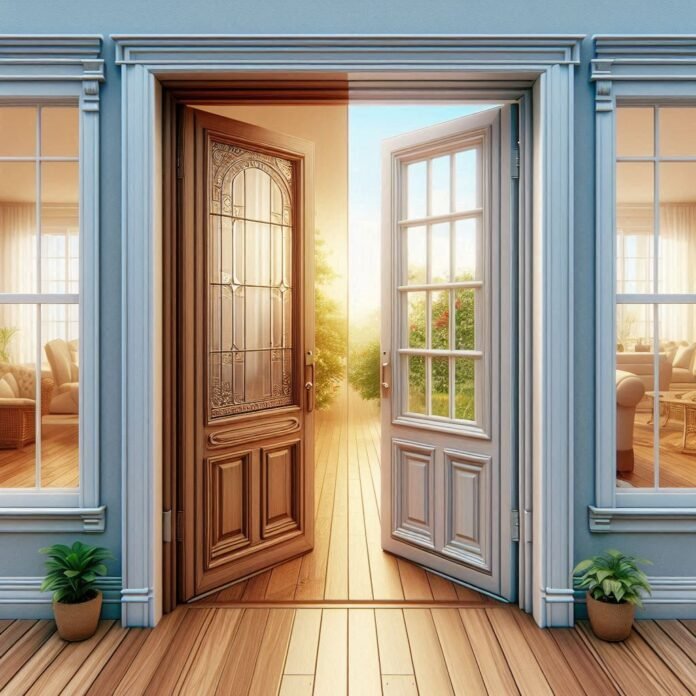When it comes to improving the comfort, energy efficiency, and overall value of your home, the type of doors you choose can play a significant role. Among the most important decisions homeowners face is whether to install double glazed or single glazed doors. Both options have their pros and cons, and understanding the differences between them can help you make an informed decision that best suits your needs. In this comprehensive guide, we’ll explore the key differences between double glazed and single glazed doors, including their construction, benefits, and how they can impact your home’s performance and value.
Key Differences at a Glance
| Feature | Single Glazed | Double Glazed |
|---|---|---|
| Glass Panes | 1 | 2 |
| Insulation | Basic | Excellent |
| Noise Reduction | Minimal | Significant |
| Energy Efficiency | Low | High |
| Security | Standard | Enhanced |
| Cost | Lower upfront | Higher upfront |
| Long-term Savings | Minimal | Substantial |
1. What Are Single Glazed Doors?
Single glazed doors are made with a single pane of glass, typically ranging from 3mm to 10mm in thickness. This type of door has been the standard in many homes for decades, especially in older buildings. The glass used in single glazed doors can be clear, frosted, or tinted, depending on the desired aesthetic and privacy level.
Best Applications for Single Glazed Doors
Single glazed doors may still be suitable for certain applications:
- Internal doors where temperature control isn’t critical
- Heritage properties requiring period-authentic features
- Temporary structures or seasonal homes
- Areas with consistently mild climates
Advantages of Single Glazed Doors:
- Cost-Effective: Single glazed doors are generally 30-50% less expensive to purchase and install compared to double glazed doors. This makes them an attractive option for homeowners on a tight budget or for use in areas where thermal efficiency is less of a concern.
- Lightweight: Because single glazed doors use only one pane of glass (typically 4-6mm thick), they are 40-60% lighter than double glazed units. This makes them easier to handle during installation and reduces wear on hinges and frames over time.
- Easier Replacement: Single panes can be replaced more quickly and affordably if damaged.
Disadvantages of Single Glazed Doors:
- Poor Insulation: The biggest drawback of single glazed doors is their lack of insulation. A single pane of glass provides minimal resistance to heat transfer (U-value of ~5.7 W/m²K), meaning that cold air can easily enter your home in the winter, and cool air can escape in the summer. This can lead to 20-30% higher energy bills as your HVAC system works harder.
- Less Soundproofing: Single glazed doors typically only reduce noise by 20-25 decibels, allowing more external sounds to penetrate your home. This can be a significant downside if you live near busy roads, airports, or noisy neighborhoods.
- Lower Security: Single glazed doors are generally less secure than double glazed doors. The thinner glass is easier to break (typically requiring only 5-10 joules of impact energy), making them a less effective deterrent against intruders.
- Condensation Issues: Single glazed surfaces are 3-4 times more likely to develop condensation, which can lead to mold growth and wood frame damage over time.
2. What Are Double Glazed Doors?
Double glazed doors are constructed with two panes of glass separated by a 6-20mm gap, which is typically filled with air or an insulating gas like argon. This design creates a thermal barrier that significantly reduces heat transfer (U-value of ~2.8 W/m²K) and improves the door’s overall performance.
Ideal Uses for Double Glazed Doors
Double glazing excels in these applications:
- External doors in all climate zones
- Homes near high-noise areas (roads, airports, schools)
- Energy-efficient home designs
- Properties requiring enhanced security
Advantages of Double Glazed Doors:
- Enhanced Insulation: The primary benefit of double glazed doors is their superior insulation properties. The gap between the two panes of glass acts as a thermal break, reducing heat transfer by 50-60% compared to single glazing. This means your home stays warmer in winter and cooler in summer, typically reducing energy bills by 10-20%.
- Improved Soundproofing: The extra layer of glass in double glazed doors can reduce noise transmission by 35-40 decibels – equivalent to reducing a loud conversation to a whisper. This makes them ideal for urban areas or noisy environments.
- Increased Security: Double glazed doors are significantly more secure. The laminated or toughened glass used in many units can withstand 20-30 joules of impact energy, and the dual-pane construction makes forced entry much more difficult.
- Condensation Reduction: The insulating layer between panes keeps the inner glass closer to room temperature, reducing condensation by 60-80% compared to single glazing.
- UV Protection: Many double glazed units include Low-E coatings that block 60-75% of UV radiation, protecting interior furnishings from sun damage.
Disadvantages of Double Glazed Doors:
- Higher Initial Cost: Double glazed doors typically cost 30-100% more than single glazed alternatives. However, the payback period through energy savings is usually 5-7 years in most Australian climates.
- Heavier Weight: The additional pane and framing makes double glazed doors 50-100% heavier, requiring stronger frames and hardware. Professional installation is strongly recommended.
- Potential for Seal Failure: While modern units are durable, the seals can fail after 15-20 years, allowing gas to escape and moisture to enter between panes. High-quality units typically come with 10-20 year warranties against seal failure.
3. Comparing Energy Efficiency
Energy efficiency is where double glazed doors demonstrate their most significant advantage:
| Metric | Single Glazed | Double Glazed | Improvement |
|---|---|---|---|
| U-Value (W/m²K) | 5.7 | 2.8 | 51% better |
| Solar Heat Gain | High | Controlled | Customizable |
| Condensation Risk | High | Low | 70% reduction |
| Annual Energy Savings | – | $100-$300 | 10-20% |
According to the Australian Window Association, upgrading from single to double glazing can reduce heat transfer by up to 50% and lower HVAC costs by 10-20% annually. In extreme climates like Darwin or Hobart, these savings can be even greater.
4. Impact on Property Value
The property value benefits of double glazing are well documented in Australian real estate markets:
- Valuation Increase: Energy-efficient features like double glazing can increase property values by 5-10% according to recent REIA studies
- Marketability: Homes with double glazing sell 15-30% faster in most capital cities
- Rental Premium: Investment properties with double glazing command 5-15% higher weekly rents
- NABERS Rating: Contributes to higher energy efficiency ratings, increasingly important for buyers
5. Aesthetic Considerations
Modern double glazed doors offer comparable aesthetic options to single glazed units:
- Frame Materials: Available in timber, aluminum, uPVC, and composite options to match any architectural style
- Glass Options: Clear, frosted, tinted, patterned, or decorative glass available in double glazed configurations
- Slimline Profiles: Modern double glazing can achieve similar sightlines to single glazing
- Custom Finishes: Powder coating and wood stains available to match existing decor
Making the Right Choice for Your Home
Consider these factors when deciding between single and double glazed doors:
- Climate: Double glazing is essential in extreme climates; may be optional in temperate zones
- Noise Levels: Prioritize double glazing in urban or noisy areas
- Budget: Consider long-term savings versus upfront costs
- Security Needs: Double glazing provides better protection
- Planned Tenure: If staying long-term, double glazing pays for itself
Conclusion
When deciding between double glazed and single glazed doors, it’s important to weigh the pros and cons of each option in relation to your specific needs and budget. While single glazed doors may be suitable for certain limited applications, the overwhelming advantages of double glazed doors—particularly in terms of energy efficiency (50% better insulation), security (2-3x more resistant to break-ins), comfort (70% less condensation), and property value (5-10% increase)—make them the superior choice for most Australian homes. Investing in quality double glazed doors delivers measurable benefits that continue paying dividends for decades.
Next Steps: For homeowners considering double glazed doors, we recommend:
- Getting quotes from at least 3 local suppliers
- Checking for available energy efficiency rebates
- Reviewing product warranties (look for 10+ years)
- Consulting with an expert about your specific needs















